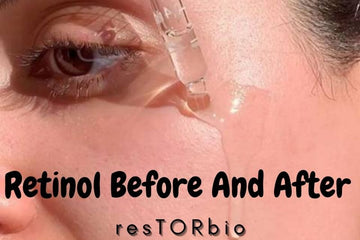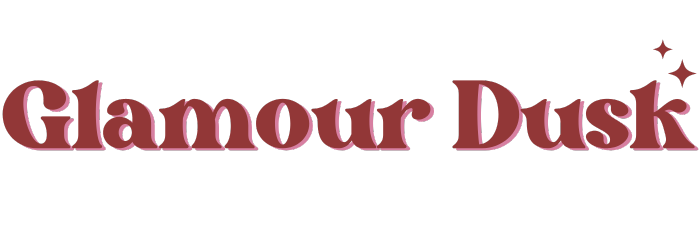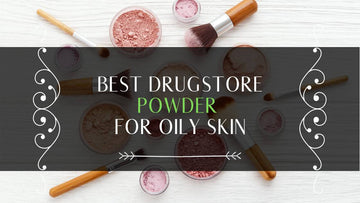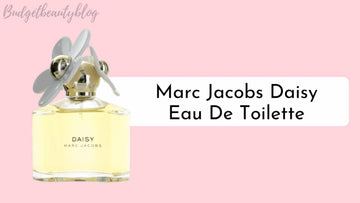
Retinol is a popular skincare ingredient that is used to treat a variety of skin concerns. It is most commonly used to treat acne, but can also be used to reduce the appearance of wrinkles and fine lines.
Many people see a noticeable difference in their skin after using retinol, and it has become a popular choice for those looking for effective skincare treatment.
In this blog post, resTORbio will show you the changes in Retinol before and after usage in your skin. Let's dive in.
 One type of retinoid is Retinol, a derivative of vitamin A. It's used to combat wrinkles and can be found in many skincare products. Many people mistakenly believe that Retinol can be used as an exfoliant. It is actually an antioxidant.
Mikhail explains that the active ingredient, Retinol, must undergo two steps before applying it to the skin. She explains that it is converted to retinaldehyde and then to active retinoic acids. To become involved, however, retinol esters must go through three steps.
First, it must be converted into Retinol. Retinoids can be converted to the active form of retinoic acid. Once that happens, they are incorporated into your skin cells to affect how they behave.
Mikhail says that pure retinoic acid can be purchased over-the-counter (tretinoin), but you can also get retinol esters and Retinol via prescription. "The closer you get to retinoic acids, the better it works and the most drying and irritating," Mikhail says.
A well-formulated, stable product containing Retinol can visibly reduce the appearance of sun damage, lines, wrinkles, brown spots, and wrinkles.
Rouleau explains that Retinol can stimulate skin cell metabolism and promote collagen production. Its magic is its ability to smoothen the skin's texture and give it a more even-toned appearance.
Check out Types of Anti Aging Hand cream with Retinol
One type of retinoid is Retinol, a derivative of vitamin A. It's used to combat wrinkles and can be found in many skincare products. Many people mistakenly believe that Retinol can be used as an exfoliant. It is actually an antioxidant.
Mikhail explains that the active ingredient, Retinol, must undergo two steps before applying it to the skin. She explains that it is converted to retinaldehyde and then to active retinoic acids. To become involved, however, retinol esters must go through three steps.
First, it must be converted into Retinol. Retinoids can be converted to the active form of retinoic acid. Once that happens, they are incorporated into your skin cells to affect how they behave.
Mikhail says that pure retinoic acid can be purchased over-the-counter (tretinoin), but you can also get retinol esters and Retinol via prescription. "The closer you get to retinoic acids, the better it works and the most drying and irritating," Mikhail says.
A well-formulated, stable product containing Retinol can visibly reduce the appearance of sun damage, lines, wrinkles, brown spots, and wrinkles.
Rouleau explains that Retinol can stimulate skin cell metabolism and promote collagen production. Its magic is its ability to smoothen the skin's texture and give it a more even-toned appearance.
Check out Types of Anti Aging Hand cream with Retinol
 This article will explain each benefit of Retinol and how it can be used in your daily routine. This is the article you need to read to reduce visible signs of aging and acne or restore your skin tone.
This article will explain each benefit of Retinol and how it can be used in your daily routine. This is the article you need to read to reduce visible signs of aging and acne or restore your skin tone.

What is Retinol?
 One type of retinoid is Retinol, a derivative of vitamin A. It's used to combat wrinkles and can be found in many skincare products. Many people mistakenly believe that Retinol can be used as an exfoliant. It is actually an antioxidant.
Mikhail explains that the active ingredient, Retinol, must undergo two steps before applying it to the skin. She explains that it is converted to retinaldehyde and then to active retinoic acids. To become involved, however, retinol esters must go through three steps.
First, it must be converted into Retinol. Retinoids can be converted to the active form of retinoic acid. Once that happens, they are incorporated into your skin cells to affect how they behave.
Mikhail says that pure retinoic acid can be purchased over-the-counter (tretinoin), but you can also get retinol esters and Retinol via prescription. "The closer you get to retinoic acids, the better it works and the most drying and irritating," Mikhail says.
A well-formulated, stable product containing Retinol can visibly reduce the appearance of sun damage, lines, wrinkles, brown spots, and wrinkles.
Rouleau explains that Retinol can stimulate skin cell metabolism and promote collagen production. Its magic is its ability to smoothen the skin's texture and give it a more even-toned appearance.
Check out Types of Anti Aging Hand cream with Retinol
One type of retinoid is Retinol, a derivative of vitamin A. It's used to combat wrinkles and can be found in many skincare products. Many people mistakenly believe that Retinol can be used as an exfoliant. It is actually an antioxidant.
Mikhail explains that the active ingredient, Retinol, must undergo two steps before applying it to the skin. She explains that it is converted to retinaldehyde and then to active retinoic acids. To become involved, however, retinol esters must go through three steps.
First, it must be converted into Retinol. Retinoids can be converted to the active form of retinoic acid. Once that happens, they are incorporated into your skin cells to affect how they behave.
Mikhail says that pure retinoic acid can be purchased over-the-counter (tretinoin), but you can also get retinol esters and Retinol via prescription. "The closer you get to retinoic acids, the better it works and the most drying and irritating," Mikhail says.
A well-formulated, stable product containing Retinol can visibly reduce the appearance of sun damage, lines, wrinkles, brown spots, and wrinkles.
Rouleau explains that Retinol can stimulate skin cell metabolism and promote collagen production. Its magic is its ability to smoothen the skin's texture and give it a more even-toned appearance.
Check out Types of Anti Aging Hand cream with Retinol
What's The Difference Between Retinol, Retin-A, and Retinoid?
Retinol and Retin-A are both parts of the class known as retinoids, according to Nazarian. She says that both Retinol and Retin-A can promote faster skin cell turnover. Both are also proven to reverse the signs of skin aging. Retinol over-the-counter must be converted in the skin to the active form. On the other hand, Retin-A is a prescription product that is stronger and slightly more effective in fighting wrinkles and combating acne. A dermatologist will be able to prescribe you the outcome. Rouleau says that Retin-A helps restore the structure of cells by cellular turnover in the epidermis. This makes them less likely to get into the pores and block them, which results in smaller pores and fewer breakouts. It also reduces wrinkle appearance by smoothing and retexturing the skin's surface and decreasing pore size.Benefits From Retinol Before and After Usage
 This article will explain each benefit of Retinol and how it can be used in your daily routine. This is the article you need to read to reduce visible signs of aging and acne or restore your skin tone.
This article will explain each benefit of Retinol and how it can be used in your daily routine. This is the article you need to read to reduce visible signs of aging and acne or restore your skin tone.
Combats Fine lines and Wrinkles with Retinol
We have 33% of our body's total protein content in collagen, making it the most crucial protein. Why is collagen so important? Collagen is an essential building block of bones, ligaments and tendons as well as skin. The Greek word "kolla", meaning glue, gives collagen its name. This glue holds everything together. Like many other things in life, the aging process profoundly impacts collagen production. Our bodies don't produce as much collagen as we do, and the quality of what it does make is less. The impact on your skin's appearance is clear: your skin will become less firm and supple as you use less glue. What is the result? Fine lines and wrinkles. Enter: Retinol. This powerful Vitamin A derivative can significantly impact your collagen levels. It is believed to increase collagen production at a genetic level. It acts as replacement therapy for the loss of collagen. Second, after exposure to UV light, Retinol stops the production of an enzyme called collagenase. Contrary to its appearance, collagenase actually breaks down collagen. Therefore, Retinol prevents the production of collagenase after UV exposure. Last but not least, Retinol stops glycation. This happens when the sugar from your blood attaches with proteins to form Advanced Glycation End Products (or AGE's). AGEs can cause skin and structure damage and lead to, yes, aging. You will see results in 2-3 months. You can expect to see more results for deeper wrinkles within 6-12 months.Improves The Skin Texture And Tone
Many factors can affect your skin's texture and color. Exfoliating too often without a broad-spectrum sunscreen can make your skin dry and rough. All elements can harm your skin's surface and tone, even extreme cold or dryness. As you get older, your skin becomes thinner and paler. The number of dead skin cells on your skin is the most crucial issue regarding texture and tone. Our dead skin cells don't get rid of as quickly, so they build up. This causes the skin to look dry and blotchy. Skin with many dead cells can cause a rough texture and uneven tone. This is where Retinol comes in handy again. Retinol will increase cell regeneration and smoothen the skin's surface. The antioxidant can also reduce the effects of UV damage, diminish dark spots, and help regulate Melanin production. This pigment adds color to the skin. You can expect improvements in your skin texture and color starting in 2 months. More advanced results will appear in 3 months.Helps Skin Firmness
Elasticity refers to the magical property of skin that snaps back to its original position when you apply pressure. Elastin is a protein that stops being produced in large quantities in the teen years and early adulthood. It also becomes less abundant over time, much like collagen. Retinol not only strengthens this protein, but some research has even shown that it can help build it. Combining the Retinol's effect on elastin with the increase in collagen levels, our skin layers will improve, leading to greater firmness. These effects will begin to show after 3 months. In 6 months, more dramatic results can be expected. Retinol can make your skin firmer, but it won't give you the same results as injectable fillers for volume loss and sagging. Want to know more about injectable fillers? Check out our comprehensive guide to injectable fillers that explains how they work and provides detailed information about some of the most popular on the market.Clogged Pores And Some Kinds of Breakouts Targets like Acne
One of the leading causes of breakouts is clogged pores. Blackheads and whiteheads can form when your follicles are clogged up with oil, dirt, and skin cells. Retinol is known to help cell turnover. But did you know that it also regulates the production of sebum? Retinol helps clear your pores from the dead skin cells that can cause clogging. It also balances your body's oil production, which means it helps reduce the amount of oil trapped in your pores. Retinol is not recommended for severe breakouts because of its sensitive nature. However, it can reduce blackheads and whiteheads as well as clogged pores. Retinol is also a good choice to reduce the appearance of large pores. It can remove dirt and oil buildup. Retinol causes cell turnover and removes old skin cells. This results in healthier cells, which produce smaller pores. Retinol can improve your pores in as little as one month. Advanced improvements are possible starting at three months.What is the Strength of RETINOL Best For Addressing Concerns?
When you search for products that contain Retinol in them, you will notice that many companies do not disclose the Retinol content of their products. It's difficult to know how much and what strength you are using. The good news is that there's a rule of thumb that will help you determine how much of each ingredient is needed. If that is not enough to satisfy your desire to control what you put on your skin, we have more information. You should look for products with Retinol levels of 0.025% to 1. Start with 0.025% if you are only starting to see the first signs of aging or if you are using Retinol for preventative purposes. This is also a great place to start if your skin is sensitive. It's the lowest concentration and most likely to irritate. The 1% concentration is recommended if you fight stubborn signs of aging. This concentration is stronger and more likely to irritate. We recommend starting small. Retinol should be used only 3 times per week until you get used to it. While 1% is the maximum strength for over-the-counter products, some formulas advertise 1.5% Retinol concentrations. These formulas can be dangerous, especially if the ingredient is unfamiliar to you. These are only guidelines. More advanced forms of Retinol encapsulation and types allow for higher percentages (2.5%) in formulas.Best Retinol Creams & Serums For Results





